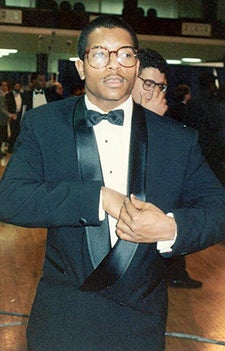
When the phone rings, bust a move
Economics major Marvin Young was living in the Troy East on-campus apartments during his junior year at USC when he got his big music industry break.
The year was 1987, and when Young wasn’t studying microeconomics or serving as a student senator, he was looking to make a name for himself in hip-hop, rapping under the name Young M.C.
The previous summer, while he was home in New York City visiting his family, Young made demos and shopped them around to local music labels. Then a friend connected him with the founders of Los Angeles-based Delicious Vinyl.
Back on campus for the Fall semester, Young got a call from the label’s executives asking him to give them a sample of his rhymes.
“I rapped about five verses over the phone and they liked it,” Young said. Soon after, they sent a record contract to his dorm room. “I didn’t really have money for an attorney so I read it over thoroughly and I asked some of my friends in the law school to look it over for me. Then I signed the deal.”
A banner year
The first record that Young produced was Stone Cold Rhymin’ in 1989 — the same year he earned his bachelor’s degree in economics from USC Dornsife.
“Graduation is normally a time of concern because you don’t know what exactly you’re going to be doing next,” Young said. “But I had a pretty decent idea of what the next six months were going to be. Then the record took off and by around January of the year after I graduated, I won my Grammy and the record was double platinum. Everybody knew me.”
His break-out single “Bust a Move,” which came out during finals week of his senior year, skyrocketed Young to stardom. The song earned him a Grammy Award for Best Rap Performance, an American Music Award for Best Rap Artist and the Billboard Award for Best New Pop Artist.

Young took home a Grammy Award in 1990 for Best Rap Performance for his hit song “Bust A Move.” Photo by Alan Light.
Young recalled that it took a while for him to realize exactly how well-received his music was. Prior to Stone Cold Rhymin’, Young had co-written the multiplatinum hits “Wild Thing” and “Funky Cold Medina” with hip-hop artist Tone LÃ…Âc, on whose record, LÃ…Âc-ed After Dark, they appeared. Young was worried he would be known for writing hits for other people, but unable to write a hit for himself.
“When ‘Bust a Move’ came out they played it on MTV, but I didn’t have MTV in my little apartment. You have to remember, cable was in its infancy. There was no Internet. Hardly anyone had a cell phone. I only knew the record was hot when I landed in a city and the people there knew it. I thought, ‘Oh, they like me here.’ Then I went to another city and thought, ‘Oh, they like me here, too.’”
The real “pinch-me” moments came when he met musical icons — Anita Baker, Prince, Gloria Estefan, Sting — and they knew his music.
Auspicious beginnings
Young started rapping as an 11-year-old in the Hollis neighborhood of the New York City borough of Queens, where a number of hip-hop artists, including Run-DMC, came up.
As Young recalled, “Jam Master Jay got his hair cut at the barber shop near my house. Run-DMC lived close by. LL Cool J was not far away. At that time you could take a New York City subway map and you could mark a lot, if not the majority, of the hip-hop world.”
He was the youngster on the scene, but that didn’t stop him from performing alongside his older counterparts.
“It did amazing things for me in terms of my musical talent and my maturity. It’s almost like I was JV competing against varsity all the time so I just developed my skills to a certain place where I was like, ‘I don’t care if this person is twice my age, I’m going to hold my own lyrically.’ I’ve taken that with me. So even now, going out and doing shows in my 40s, I still have the same approach and zeal that I had when I was a teenager and a pre-teen.”
Joining the Trojan Family
When the time came for Young to attend college, he chose USC for its academic program and to broaden his horizons by moving to a new city.
“I wanted to go out west and I liked ’SC,” Young said. He was inspired to study economics by a high school teacher. Young had attended the academically rigorous Hunter College High School on Manhattan’s Upper East Side. “I took economics during my junior year and fell in love with it. I knew that I wanted to study microeconomics in college. From household budgets to municipal budgets — I could relate to it.”
At USC, he found the faculty and the teaching assistants to be very supportive. “I found a really nurturing relationship from when I first arrived at USC,” Young said.
Young served as vice president of Trojan Hall during his sophomore year, and then later as a student senator during his junior year — a whirlwind time for Young, to say the least. That year, he was taking a full load of classes and working as a ticket-taker and usher at the Coliseum, all the while recording his first album.
“That was the busiest time for me, 3,000 miles from home, as it was,” he said. “But I found myself so focused, and that really led to a lot of my approach to my work in adulthood. I’m such a multitasker.”
Young said that his degree has served him well as an entrepreneur. As someone who has had a music corporation since his junior year in college and manages his own music career, he said it’s an asset.
“In my business, if you’re sitting across the desk from an executive, they normally don’t expect the talent to have any kind of formal education, or any education close to theirs,” he said. “So it has been positive for me in terms of conducting business on my own behalf.”
Rhyming and writing
To date, Young has released nine albums and continues to perform — he’s currently part of a national “I Love the ’90s” tour with musical contemporaries such as Tone LÃ…Âc, Salt N Pepa, Coolio and Kid N Play.
Recently, Young has also ventured into filmmaking, which is no surprise since his lyrics have always been defined by a narrative style — “Bust a Move” is at its core a series of vignettes about wooing a girl.
He wrote, directed and acted in the film Justice Served, which he’s shopping around for distribution, and has plans to produce additional movies in the future.
Young points to the same traits that he developed in college — perseverance and focus — as essential to his success in his music career and key to his foray into movie-making.
“I’m looking forward to working on my next film for the simple fact that I’ll have the confidence of approaching it the same way I have the confidence in approaching music and the same way I had confidence leaving home, going to college in California, rapping over the phone — all of these pretty extraordinary things that have happened to me. It makes me realize that I can accomplish quite a bit.”
When it comes to dreaming big, Young’s advice to students — especially if their career path is nontraditional — is to keep working hard at what they love and to focus on their successes.
“Even if you fail 99 times, if you feel success is your norm, that one time you make it, it will feel normal and those 99 failures will feel like anomalies. That’s how I approach things.”